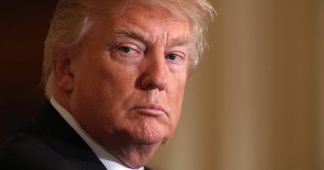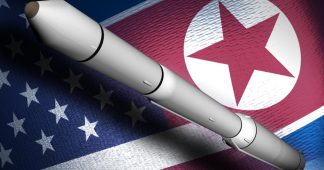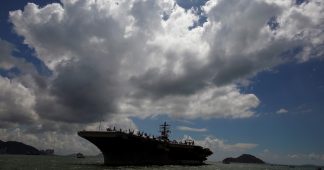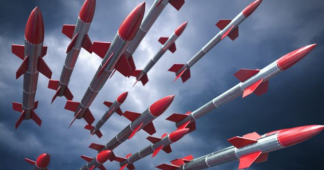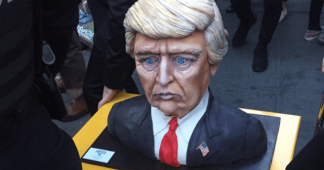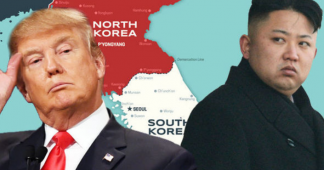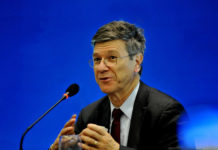Trump: US “totally prepared” for war with North Korea
By Peter Symonds
26 October 2017
As US President Donald Trump prepares to begin his first trip to Asia next week, the US is ramping up the threat of war against North Korea with the deployment of three aircraft carrier strike groups to the Pacific.
Trump, who will visit South Korea and Japan, boasted on Fox Business Network on Sunday that the US was “prepared for anything” when it comes to North Korea. The US president was conciliatory toward China ahead of talks with Chinese President Xi Jinping, praising its sanctions on Pyongyang.
Trump, however, followed with a chilling warning: “We are so prepared, like you wouldn’t believe. You would be shocked to see how totally prepared we are if we need to be.”
While Trump refused to be drawn into providing further details, the naval build-up in the Pacific speaks volumes. The nuclear-powered aircraft carrier USS Nimitz arrived in the Pacific on Tuesday, joining the USS Ronald Reagan, based in Japan, and the USS Theodore Roosevelt, which entered the Pacific on Monday.
Navy officials downplayed the arrivals, but the presence of three aircraft carrier strike groups in the Pacific is very rare. The USS Nimitz, which is returning from the Middle East, is not just transiting to its home base. According to 7th Fleet officials, it is scheduled for a port visit in Japan or South Korea and would be ready “to support operations throughout the Pacific.”
The arrival of two additional aircraft carriers follows major US-South Korean naval war games last week, involving the USS Ronald Reagan, three nuclear submarines, Aegis destroyers and more than 40 other warships. The drills were the latest in a succession of joint military exercises in preparation for war with North Korea that have generated extreme tensions on the Korean Peninsula.
The US military preparations take place amid bitter infighting in Washington, fuelled in part by fears that an attack on North Korea could be imminent. NBC News reported yesterday that Joseph Yun, US Special Representative for North Korea, has been raising the alarm in Washington that diplomatic efforts to end the confrontation with Pyongyang are in peril.
NBC News cited one US official as saying Yun’s diplomatic efforts were on their “last legs.” He said Yun was frustrated by an inability to communicate the urgency of the diplomatic situation to the White House.
In reality, Trump has never been interested in a “diplomatic solution”—other than one that involves the abject capitulation of the Pyongyang regime to all of Washington’s demands. Last month, when US Secretary of State Rex Tillerson signaled in China that he was sounding out North Korea for talks, Trump tweeted that Tillerson was “wasting his time.”
Speaking to NBC News, another US official made clear that US “diplomacy” is nothing more than an ultimatum, backed by the threat of war. “It is not so much that North Korea is shutting down [diplomacy],” he said, “it’s that the message from the US government is, ‘surrender without a fight or surrender with a fight’.”
Senate Foreign Relations Committee Chairman Bob Corker, who is openly critical of Trump, has expressed concerns over the president’s failure to pursue negotiations with North Korea.
“When you kneecap that [diplomatic] effort you really move our country into a binary choice which could lead to a world war. I want him [Trump] to support diplomatic efforts, not embarrass and really malign efforts that are underway,” Corker told NBC’s “Today” program on Tuesday.
These comments are driven by fears that a US attack on North Korea will provoke widespread opposition. A Washington Post-ABC News poll last month found that 67 percent of respondents oppose pre-emptive US strikes on North Korea and agree with military action only if Pyongyang were to attack the United States or one of its allies.
By boxing Pyongyang into a corner, the Trump administration has deliberately inflamed an already dangerous flashpoint. The US Congress voted this week to impose sweeping new sanctions on North Korea, targeting any people or companies associated with the North Korean regime and cutting off all financial assistance to other foreign governments allowing transactions beneficial to Pyongyang.
In such a situation, a minor incident, whether accidental or calculated, could plunge the region into a war that could draw in China and other major powers. Given the constant stream of US threats and provocations, the unstable North Korean regime can only assume that it faces an imminent onslaught from the world’s largest military, and act accordingly.
In comments yesterday to CNN, senior North Korean official Ri Yong-pil warned that Trump’s belligerent stance was leading to conflict. “The US is talking about a military option and even practising military moves,” he said. “They’re pressuring us on all fronts with sanctions. If you think this will lead to diplomacy, you’re deeply mistaken.”
Ri indicated that North Korea would continue to develop its nuclear arsenal. Pressed on comments last month by Foreign Minister Ri Yong-ho that North Korea could test a hydrogen bomb over the Pacific, the North Korean official dismissed suggestions that it was a bluff.
“The foreign minister is very well aware of the intentions of our supreme leader [Kim Jong-un], so I think you should take his words literally,” Ri Yong-pil warned.
The confrontation on the Korean Peninsula is rapidly approaching a tipping point. Trump has repeatedly declared he will not allow North Korea to arm itself with a nuclear missile that can strike continental America.
Last week CIA director Mike Pompeo said North Korea was only months away from having such a capacity. “They are close enough now in their capabilities that from a US policy perspective we ought to behave as if we are on the cusp of them achieving” that objective, he said.
Japanese Foreign Minister Itsunori Odonera on Monday asserted that North Korea’s missile and nuclear capabilities have grown to an “unprecedented, critical and imminent” level and required “different responses.” He effectively supported a pre-emptive US attack on North Korea, saying he endorsed the US view that “all options”—that is, including the military one—must be considered.
Short of North Korea’s complete submission, the Trump administration has set the stage for a catastrophic war that could engulf the world.
